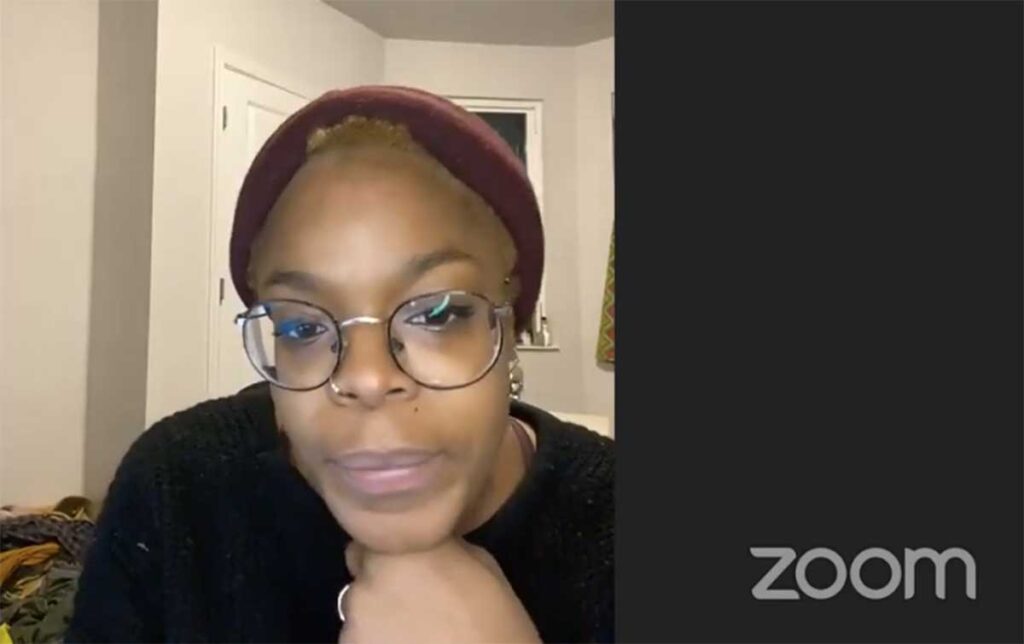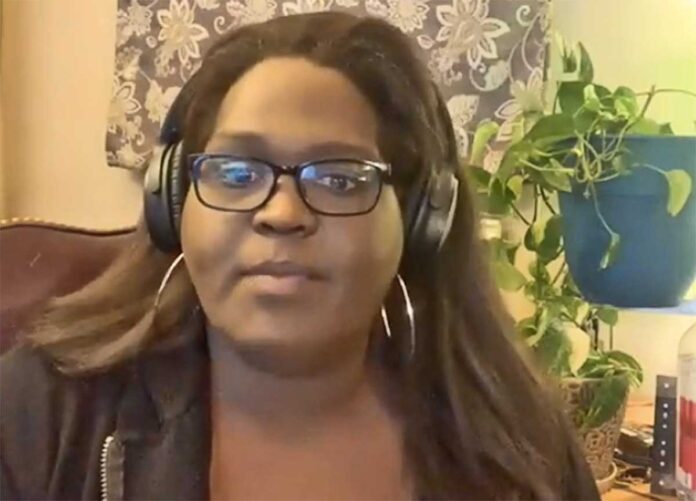Last week the organizers of the Philly Trans March produced the 5th annual Philly Black Trans History: A Multigenerational Panel Discussion. The panel included Philadelphia-based queer and transgender people of color discussing the work that they do and the historical issues surrounding the trans community.
The evening began with a slideshow of names and photos of the trans people that the community lost in 2020, 2021 and earlier in history, including trans and HIV/AIDS activism leaders Jaci Adams and Charlene Arcila as well as entertainer and trans rights advocate Nizah Morris.
Moderated by Trans Equity Project recruiter and trans activist Mikah Thomas, the panel included Philly Trans March and Trans Masculin Advocacy Network founder and panel organizer Christian A’Xavier Lovehall; performer and long-time Philadelphia AIDS Consortium (TPAC) worker Tina Montgomery; youth organizer and food justice advocate Shania Morris; transformative justice advocate, abolitionist and aspiring death doula Azalea Korryn; and performer, former radio personality and current member of the Mayor’s Commission on LGBT Affairs Aeryanah Von Moi.
Trans activists Bri Golphin, Deej Nutz, Alonda Talley and Sunny Marks co-organized the event, also made possible by logistics coordinators Roberto Thornton and Imani. Diamond David, the first nonbinary Mx Philadelphia Leather, sang “Lift Every Voice and Sing,” which the National Association for the Advancement of Colored people adopted as their official song.
Thomas asked questions to individuals and the group, leaving room for organic discussion. Topics ranged from words of advice that members of older generations would give to younger trans folks, how the panelists define resilience, how gentrification and the pandemic have impacted the fight for food justice, the ways cisgender people can be more inclusive and kind towards the trans and nonbinary community, and the exploitative practices in white-led nonprofits that target trans people of color.
Thomas asked Lovehall about the children’s book he wrote called “My Name is Troy,” about a Black trans boy whose family loves and supports him.
“The inspiration for coming out with that book is basically my life, looking back and reflecting on the lack of love that I experienced growing up,” Lovehall said on the panel. “Seeing more and more trans youth come out younger and younger, be visible, and just wanting to create something, leave something out there for young trans boys in terms of representation. Representation matters.”

When asked what they’d like trans elders to know about their struggles as a trans youth, Morris told the group, “I think about… [where I would be] if I had different support and time and space to get to know myself. That’s why I am so invested in youth and their dreams, so they don’t have fear expressing their gender identity and who they are as they find their dreams… I’m constantly still in this journey of finding who I am, of transitioning my identity as I see fit for me… I don’t think that we ever have to be bound to this binary, which makes all of us so beautiful. I’m hoping that I get to connect with more trans elders who are watching because I’m here, I’m learning from you even if I’m not in a space with you.”
As someone who has witnessed much trauma within the community of Black trans women, Montgomery said that she would tell a younger trans woman, “I come from a time when if you were walking down the street holding another one’s hand, you get locked up. I think that what we need to do for each other, let’s show each other something different. We always show each other how to get high, how to make extra money… let’s show them something like how to get a better job, [how to] get an education.” Montgomery added that she does not label herself as transgender outside of trans panels. “When I came out, I considered myself as transgender,” she said. “I don’t consider myself transgender now. My name is Tina. I don’t allow no one to put me as a label unless I’m doing something like this.”
Von Moi expressed the controversial opinion that fewer barriers exist for trans people now than previously, though she acknowledged the very real struggles that trans folks continue to face.
“I feel like sometimes by just doing it, you’re setting an example,” she said on the panel. “I did it, and the next one can do it and just keep trying. I think the one thing that we all need to do is, we can support each other more with tools to create anything that [we] want to. I don’t want anyone to give me anything — give me the tools so that I can create it for myself.”
In terms of trans folks’ freedom to create their own spaces, Korryn told the group that it is paramount that cisgender folks stop stealing from trans communities.
“Stealing our spaces that we make for ourselves, stealing our language, stealing our livelihoods, stealing our lives, period,” she said on the panel. “Also stealing our money. Number two thing — do the reverse of stealing from us, because even if you’re not actively seeing a trans person on the streat and knocking them out and taking their wallet, you’re still existing in a world where that’s the default action that happens all the time.”
Toward the close of the evening, David, Mx Philadelphia Leather, was asked to comment on how the leather and kink community can be more inclusive of Black trans people.
“They need to let us in,” David said. “And we need to start coming in there and busting out doors. I like the quote, ‘if you don’t have a seat at the table, bring a folding chair.’ That’s what I did. I wanted to make sure that my existence was visible in this community because you don’t ever see much of us [there]… I wanted to be visible, so I can show queer and trans nonbinary people that we deserve all of our accolades.”
The organizers plan to donate a portion of the money that they raised from the panel to Housing Reparations Philly and the Coalition for Black Trans Economic Liberation (CBTEL).
“This org literally did a lot for a lot of Black trans folks — I should say the entire Black LGBTQ community over the summer, especially during the pandemic,” Golphin told the group.
“Please donate because there are so many Black trans folks or Black LGBTQ people in the city,” Golphin added. “We need help now.”
The Philly Black Trans History panel can be viewed in its entirety at the Philly Trans March Facebook page. Donations to CBTEL can be made through Cash App at $CBTEL or Paypal.me/CBTEL.
